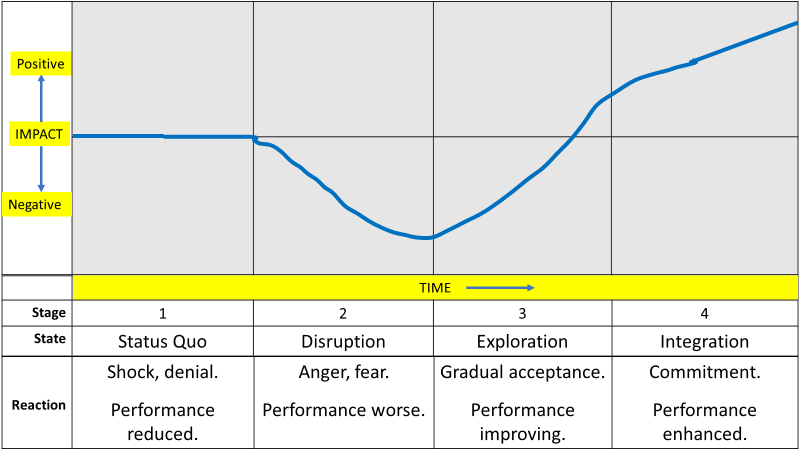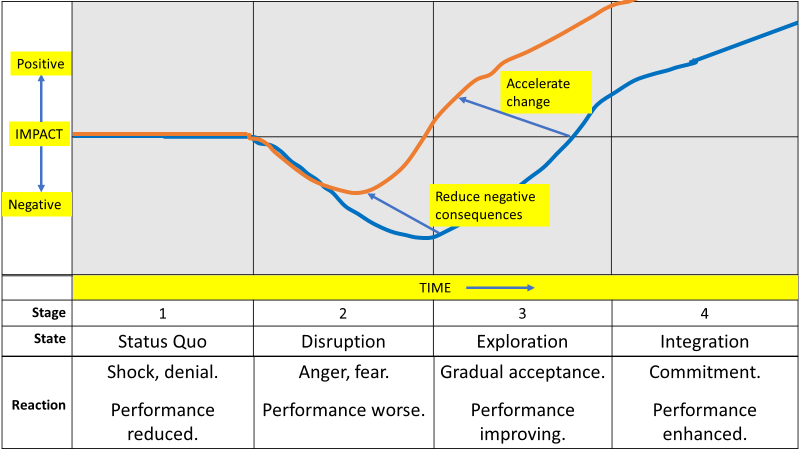Having to change jobs, accommodation, work roles etc. is stressful and even more so if it is forced on you and/or is unwanted. And then changes come in life because of changing relationships, developing work and other interests and even changes in the law. ‘Change is here to stay!’ – as the saying goes. Some changes you will take in your stride, especially if you have been looking forward to them or you have instigated them. Even then, especially when your plans do not work out as you expected or planned them, change can be stressful.

It is important, therefore to consider how change can be managed so you cope better and even turn the change to your advantage. If you understand about change and are prepared there is a better chance of surviving unscathed and even to count it as an enjoyable experience!
This is for everyone.
If you are not already in the process of change it will happen to you sooner or later so be prepared and keep on reading.
You might even be involved in creating change – and be frustrated by the apathy or even opposition from those you hoped would be enthusiastic or at least cooperative in your exciting plans. Keep on reading.
Changes that you have prepared for and perhaps initiated can create stress. That can be devastating and may make you reconsider your choices even to the extent of backing out of something major like your University plans, getting married or taking on a new job. If that has happened to you it will be stressful to revisit such an unhappy experience but this, for you, could be a journey of growth and healing – so keep on reading.
The Impact of Change
You are now doing something you are not used to doing.
You may feel awkward, ill at ease or self-conscious.
You will tend to think about what you have given up rather than on what is gained. There will be a sense of bereavement or grief for what is lost.
You will be apprehensive about the value and worth of what is to be gained.
You will have suspicions about why the change has been necessary.
You will feel lonely – even if others are going through the same change.
We are all individuals.
Change will affect each person differently.
There may be a sense of being overwhelmed – especially in long periods of change or if many things change at once.
You may experience a lack of security.
You may fear the unknown.
You may feel that all your usual ‘props’ have gone.
Different people are at different levels of readiness for change.
This is neither right nor wrong, it is not good or bad – it is just different.
Someone may see change as beneficial while another feels it is disastrous.
There may be a lack of resources.
Increased demand requires increase in capacity to cope.
It may be only when the change is in progress that there is a full realisation of the resources that are needed.
If the pressure to change relaxes, you will tend to revert to your old ways.
Relapse is natural.
Support for change needs to be on-going.
Pause for thought
Do you recollect that you have experienced some of these reactions when you have been through change? Take some time to revisit the memories. Make some notes, for your own benefit, about what happened.
As you read on, bear in mind those experiences and see what insights you gain. Change can be deeply disturbing and confusing so take it easy if your reflections stir up particularly stressful memories.
The Process of Change
There are four stages in your response to change.
Status Quo
This is where change starts. You will be comfortable, settled in what you do but then change comes. You will not like it – especially if it comes unexpectedly – so your first reaction will be negative. It is a shock. You may even reject the proposed change out of hand, in effect denying it is happening.
Your performance will deteriorate – your concentration and devotion will dip. It may affect your sleep, mood, appetite, etc. so your ability to cope with general issues of life, not just at work, will start to deteriorate.
There may be a sudden deterioration followed by a continuing decline. That blends into the second stage.
Disruption
As the reality strikes home – this is not a bad joke, it is truly happening – your negative response continues. You may be fearful of the implications and that may not be just an emotional reaction.
It may be an appreciation of a real possibility.
Can I cope?
Is this the beginning of the end?
Will there be a role for me in this new arrangement?
You may become angry.
No one takes any notice of me.
Why do I have to change?
In extreme circumstances you may protest, go on strike or attempt to sabotage the proposed changes.
You may get stuck in the Disruption phase but if the change is handled considerately you will begin to adapt and move into stage 3.
Exploration
Gradually you accept the change. You begin to see the way you can adapt to fit in with the new circumstances.
You may begin to change your mind, move away from pessimism and resistance and start to appreciate the advantages of the change. Your focus moves from what you have lost to what you will gain.
Acceptance leads to optimism. You will learn new habits and become more efficient at working with the changes.
Integration
You will test and explore what the changes mean and will begin to work with them and even develop them further so in the final stage you will recover the level of impact experienced previously and will then exceed it.
This is what change is all about. It is a pointless exercise unless it leads to benefits and progress, better control and increased satisfaction and confidence. All involved should now be benefiting from the change.
If you have already dipped into the pages about grief and loss (Uniquely You/Grief ) you will recognise parallels with the Journey of Grief. Both start with a change in circumstances which involves a sense of loss and bereavement. That leads to a phase of shock and denial before morphing into anger, despair and disillusionment.

There is then gradual acceptance and eventually an experience of new beginnings as confidence, new interests and attitudes develop. Life moves on. This is expressed in the shape of the Change Curve in the ‘Unmanaged Change’ diagram.
Working through the Change Curve
Once you understand how the process of adapting to change works, you can more easily adapt to make the journey less stressful, shorter, easier and perhaps even enjoyable! There are two aims: to reduce the negative impact of the change and to shorten the process of adaptation as illustrated in the ‘Managed Change’ diagram.

Before change is introduced
‘Forewarned is forearmed’ is an apt aphorism for this stage. The more warning there is of a forthcoming change the more you can prepare emotionally, even if not practically. If there is a long delay the change can be almost a relief, ‘the waiting is over, now let me get on with it!’
Information about what might happen is crucial to help the preparation stage – if the leaders of change do not explain this you will imagine it – and will probably focus on your worst fears. Such is human nature.
When change is imminent the need for information increases. What training is there? How much time do I need to set aside for learning about the changes? Does the old system run in parallel with the new system during this period?
What about mistakes made in the change-over period – will they be recognised? Who will be responsible for them?
Change is introduced
Even if the change is expected, prepared for and welcomed there will be a stage of uncertainty that at the least will include anxieties about your personal ability to understand, cope and survive. They will only be resolved as you do in fact understand, cope and survive.
You will be on edge though and at the slightest hint of problems, confusion or failure you may respond with resentment, fear and anger depending on how sensitive the change is and how much you are involved emotionally and practically. If there are any delays in resolving issues everyone will be entering a ‘danger zone’ when a crisis or chaos may develop very quickly. A prime example happened at ‘The Great Timetable Fiasco’ in May 2018 as reported in a national UK newspaper.
A train timetable revolution is in disarray after dozens of trains were cancelled on day one, with chaos for commuters set to continue for up to a month. Nigel Harris, editor of trade magazine Rail, said it was “the most chaotic, fundamental and humiliating failure it has been my misfortune to witness in 40 years as a rail journalist”.
What had been billed as a boost to services instead saw thousands cancelled: plummeting punctuality statistics masked even greater local problems. In some peak periods on some train lines, two in three trains were failing to run at all. Instead of a few days of hiccups, it swiftly became clear weeks of convulsions were ahead, with emergency timetables being introduced to slash services and stem the chaos.
Around 8,000 services in one area were cancelled or severely delayed, while some 5,000 trains in another area suffered the same fate – excluding two days of strikes when 2,000 trains were pulled in advance.
Wow! That was some chaos! The principles of introducing change are well established so take this as a cautionary story. If a national business can make such an appalling mess there is a real danger it can happen again.
It is a reminder of another aphorism, ‘Always finish what you start.’ That is true for organisations as well as individuals. It is asking for trouble to start a project if you do not have the time and resources to finish it.
The Turning Point
Suddenly, well it may appear to be like that, things start to come together. You begin to do things automatically without reference to a check list or handbook. You have created a new habit. Ideally, it all moves smoothly now but if not, you will no longer despair or panic, but will work a way round the problem either by yourself or in collaboration with colleagues or the leaders of the change. The realisation of passing a turning point often comes after a break from the routine. A good night’s sleep, a weekend away or even a holiday can work wonders with your self-confidence and ability to manage.
New beginnings

The final stage is what change is all about – greater impact, more efficiency, less breakdowns, improved productivity, etc. Now, the new way of working comes automatically, and with everyone on board it may soon be time to set new targets!
Well, that really only works if everyone involved feels they have a full role in the changes introduced and the new way forward. But before doing anything else it is important to celebrate success. The human side of change needs to be acknowledged for change is costly to those involved.
It can be an emotionally charged time. Participants may have been through a stage when they doubted their ability to survive and cope. Everyone needs to be brought together, to share their stories, acknowledge each other’s contributions, commiserate with those who have had a stressful journey, laugh together and encourage each other. And then move on together.
If only life and change were always like that.
When change goes well you will tend to take it for granted – that is the way of human nature. If you have played a key role it will be thrilling, stimulating and a pleasure to look back and celebrate as you remember the part you played.
But sometimes change does not go well. Especially when it is imposed and you are expected to fit in, do as you are told, and not to complain. You will feel devalued, ignored and exploited. That may be due to the ignorance or carelessness of the leaders of change but you may be convinced it is a deliberate ploy to devalue and change your role. It may be because the change makers have a different agenda to you so you no longer have a key role but are a small cog in a big machine.
The commuters caught up in ‘The Great Timetable Fiasco’ certainly felt badly done to. They had paid for the service and they needed to get to work on time, co-ordinate their child care facilities, shopping, social life, etc. and it all fell apart. There will have been countless commuters who missed their holiday travel connections, wedding and funeral attendances, business meetings and more. One badly managed change ruined untold numbers of lives.
In such chaotic circumstances your personal management strategy needs to change. You are no longer an active part of a positive change for good so you need to protect yourself from being harmed by the process whether that be emotionally, financially, in career prospects or in other ways. Then do what you can to salvage whatever can be salvaged.
Options you might consider.
Go on holiday until the chaos is fixed.
Get out of the situation permanently by, for example, retiring, changing employment or emigrating.
Cooperate with your own local team to salvage what you can and keep your part of the system functioning and leave others to take responsibility for the bigger picture.
Suicide. If the chaos caused by change is overwhelming and the project affected has been one in which you have invested time and effort and are committed to, in one way or another, it might feel as if the world is crumbling around you. You may not be able to imagine the continuation of life in such circumstances. The emotional trauma can be so severe you may despair of it all and can see no other way but to end your own life. That is entirely understandable though it is a tragedy both for you and those left behind. Also, there is something not right if work, projects and such things are valued more highly than people and life itself.
Have you thought of suicide? Get help. Remember, ‘a problem shared is a problem halved,’ as the saying goes. Does that help? If you need to go further, one way that is freely available 24/7 to everyone is to phone the Samaritans. Otherwise, see your doctor or a counsellor.
Stand back and reflect on your life to get any current chaos you are in back into perspective. Check out Getting Started/Management Techniques and remind yourself about Be Positive and Risk-Benefit Analysis and other management topics.
Recognise that what is happening to you is a grief reaction to loss. You are going through a journey of bereavement so check out Uniquely You/Grief .

Endnote
The Change Curve is based on the work of psychiatrist Dr Elisabeth Kubler-Ross, exploring the process of living through grief and bereavement.
Information about ‘The Great Timetable Fiasco’ was taken from a Guardian newspaper article: https://www.theguardian.com/business/2018/jun/09/uk-railways-great-timetable-fiasco-whats-gone-wrong [2 Aug 2018]
